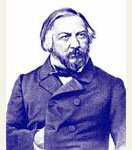Mikhail Glinka
(1804-1857)
 Mikhail Glinka is considered the father of Russian music, renowned for both his own music, as well as his influence on later composers, such as Rimsky-Korsakov and Stravinsky. Born to a noble family, Glinka experienced a wide exposure to music as a child, from the songs of the family’s servants to his uncle’s private orchestra. He knew that he was destined to a life in music before his teenage years and after attending the Noble Boarding School in St. Petersburg, he began taking violin, piano, and voice lessons. From 1824 to 1828, he held a position in a government office and though the work was not of interest to him, life in the city gave Glinka the advantage of networking with various artists.
Mikhail Glinka is considered the father of Russian music, renowned for both his own music, as well as his influence on later composers, such as Rimsky-Korsakov and Stravinsky. Born to a noble family, Glinka experienced a wide exposure to music as a child, from the songs of the family’s servants to his uncle’s private orchestra. He knew that he was destined to a life in music before his teenage years and after attending the Noble Boarding School in St. Petersburg, he began taking violin, piano, and voice lessons. From 1824 to 1828, he held a position in a government office and though the work was not of interest to him, life in the city gave Glinka the advantage of networking with various artists.
Glinka’s entire life was afflicted with health concerns, causing him to travel often, seeking relief and the help of physicians. These trips proved to be beneficial, if not only for health reasons, for artistic inspiration as well. Upon visiting Italy and meeting Donizetti and Bellini, he became increasingly more interested in Italian opera. In 1833, en route to visit his sister in Berlin, he was further motivated upon hearing the orchestras of Strauss and Lanner. It was not long after this trip that his growing desire to discover a Russian style led him to study with Siegfried Dehn in Prussia.
The death of his father brought Glinka back to his homeland, Russia, in 1834. The following year, he married Mariya Petrovna Ivanova, but the couple’s marriage ended in divorce just four years later. It was during this period that he explored the works of writers such as Pushkin and Gogol, uncovering a wealth of Russian cultural heritage. This led to his “national heroic-tragic opera”, A Life for the Tsar, which premiered in 1836. Combining Russian and Polish folk tunes with Italian-style operatic passages, the new work was well received by all. It also marked a new approach to orchestration in which the orchestra was essentially a member of the cast, not merely an accompaniment to the singers. Glinka's second great Russian opera, Russlan and Ludmilla, was not as successful, but was ultimately more influential. The first performance in 1842 introduced the whole-tone scale to the Western music world, and the innovative elements sparked a new approach for the then budding Russian composers who led the country’s classical music into the twentieth century.
The spring of 1845 landed Glinka in Spain, where he adopted more international musical ideas. The last decade of the composer’s life was never settled – he spent time moving between St. Petersburg, Warsaw, Paris, and Berlin. Though he did take time to write his memoirs, his dream of exploring Russian church music never came to fruition. The death of his mother in 1851 and his ever-declining health led to his death in 1857. Glinka continues to be remembered for his immense influence as a forerunner of the movement that fostered Russian nationalism in music and the arts. His orchestra music is certainly the most recognized, but a large percentage of his works were for piano or voice as well as a small selection of pieces for chamber or choral ensembles.
Click below to view Mikhail Glinka titles:
Click Here to see other Featured Composers
t7t3l0uhl8|0010C39D6D07|DetailContent|contenttext|DD73579E-E383-4E1C-B389-962187BE642B
<